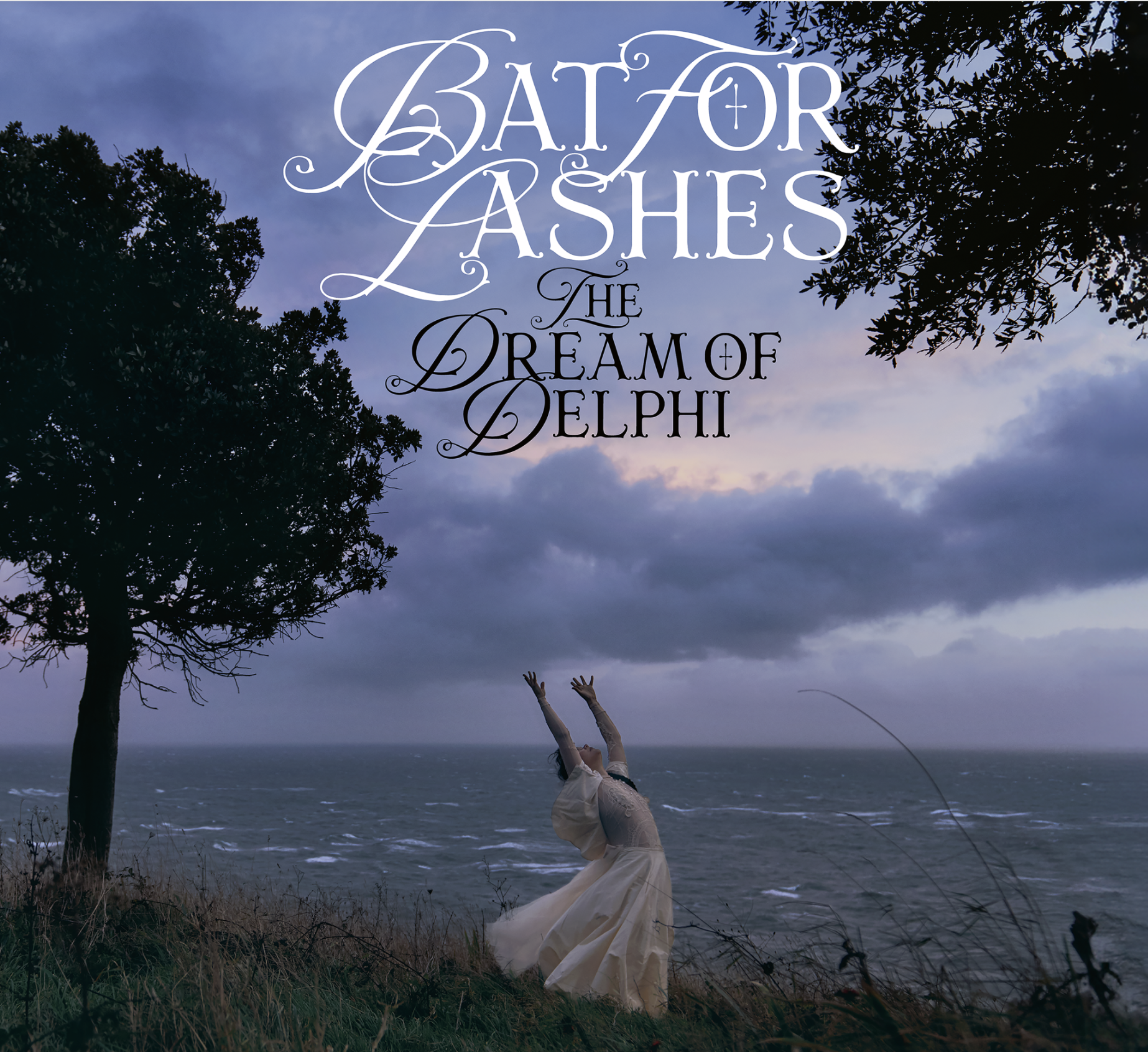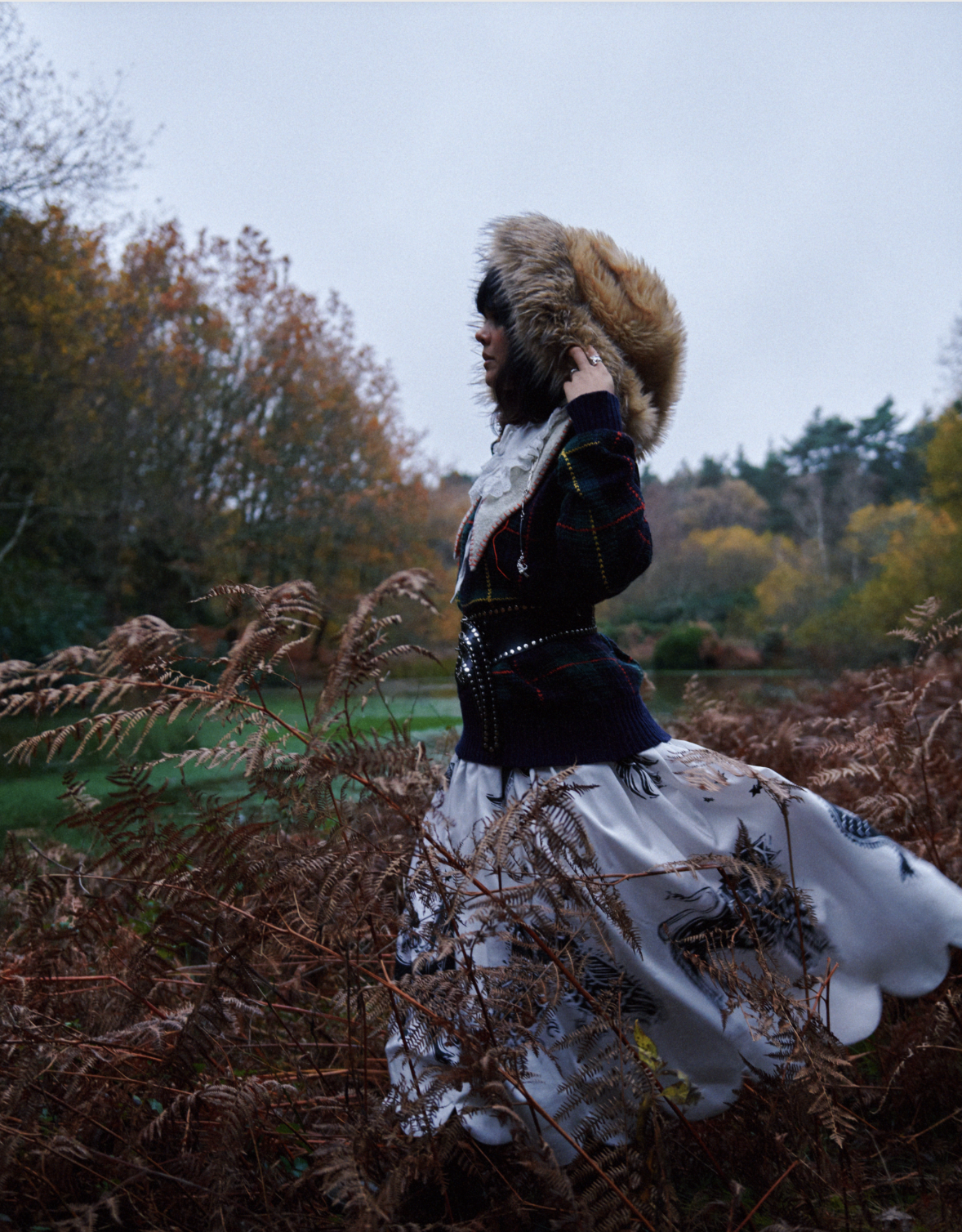- Music
- 12 Jun 24
Bat For Lashes on her decision to home birth: "I'm a bit of a feminist that way"

Natasha Khan, aka Bat for Lashes, talks all things Sinéad O'Connor, home births, maternal love and witchy Irish people.
Natasha Khan, the English singer-songwriter, producer, and multi-instrumentalist behind Bat For Lashes tells me she can’t help it: “I’m deep!
“I’m a Scorpio. I just have to get deep with everything! It’s exhausting” the three time Mercury Prize nominee says, laughing.
We’re discussing her new LP, The Dream of Delphi, a gorgeous sonic embrace for her daughter Delphi, who was born during the height of the pandemic: “This is the story of birthing Delphi and the relationship between me and her father” Khan explains.
She continues saying that her sixth album has: “fewer lyrics than usual. I suppose I am trying to capture the atmospheric; the ethereal sound of both the intimacy of the domestic space but also the lushness and celestial and spiritual aspects of new life. And how cosmic that all is.
Khan, whose work has featured in the Twilight soundtrack, is inspired by film: “I guess every album to me is the soundtrack to a story in my mind. One of my own making usually”.
If Bat For Lashes previous efforts were cinematic, her latest offering is a documentary, saying: “This one is the soundtrack to a real life story”.
The album was recorded in scattered instances as a result of being the mother to a newborn baby, with Khan saying: “I would steal away to the studio because I had so little time and I would try to translate my feelings into music through improvisation”.
 The Dream of Delphi album cover
The Dream of Delphi album coverMatriarchal Love:
A record saturated in love, Khan says of the LP: “I hope, when I die one day, I hope Delphi can have that amongst other things, as a comfort. It’s kind of my matriarchal love encapsulated for her”.
“There’s songs like ‘Letter to my Daughter’ and ‘Christmas Day’ and these things about how much she was loved and wanted. I hope that stands the test of time for her”.
I also add that The Dream of Delphi will be interesting if Delphi ever gets pregnant…. “Yeah and what she resonates with or doesn’t. Or what generational trauma comes out!” Khan adds laughing.
Family Matters:
Speaking of which, I ask how was Khan’s upbringing, and if being raised by a famous Pakistani squash dynasty impacted her artistic pursuits: “My dad was very creative- he loved to draw and tell stories and play music. But he was also an incredible sportsman (Rehmat Khan).
“So to me it made sense that he was a performer of sorts. Sportsmen are”.
Continuing she says: “There’s a ceremony and an audience to come together to watch this performance. There’s a ritualistic ceremonial aspect that’s heightened that lifts people up out of the everyday. Either through an amazing squash match or tennis tournament or show, there's always that human desire to gather together to witness something to get emotionally involved in it”.
Speaking of her mother, Khan adds that having her own child brought about: “A lot of passion, empathy and love for my own mum and the women in my family. Seeing them in Delphi and seeing myself in Delphi- you really realise how deep that love goes.”
Birthing at Home:
When it came to giving birth, the artist said that her mum’s advice influenced her decision to have a natural home birth: “My mum had told me she had gas and air and it made her feel really sick - and other people said they had epidurals and they couldn’t feel anything from the waste down”.
She continued saying: “There's quite a few women whom I have spoken to as well who felt quite disempowered that their own belief in their own ability was compromised by looking at it like a medical problem rather than an amazing coming of age act that you could manage all on your own just with nature’s help”.
“I’m a bit of a feminist in that way” she adds.
The artist did qualify, that while she pleased to have birthed at home, she supported those who birthed in hospitals, saying: "I had hospital three minutes away so I would have gone if I had needed to".

Delving into Delphi:
How appropriate, then, that The Dreams of Delphi makes allusion to the intergenerational knowledge shared by women.
Khan says that when it came to naming Delphi: “I didn't even know where it had come from. Then I looked it up and it’s innate meaning is womb which I found really interesting and beautiful, but also there’s the female oracle at the temple of Apollo, who channelled all these incredible celestial messages and I felt that made a lot of sense”.
She says: “I suppose, this album for me is sort of a matriarchal balm. I think the world is so busy and stressful and fast paced that I hope people gain from it- a sort of motherly hug”.
“I think the people that have struggled with it a bit are those who are that kind of Type A personality that don’t really understand why it’s not in a song structure and that my lyrics are not telling them what to feel.
“There’s a bit more responsibility on the listener in this to surrender their ego, or the chattering mind, or the need to know the answer to everything” she acknowledges.
The Dreams of Delphi is designed to get the listener “back into that space of childlike innocence and being sensory and intuitive and feeling things and not having to know the answers to everything, just let it sort of heal you really ... my mission is to reconnect people to this place within themselves”.
In terms of artistic inspiration, Khan cites Sinéad O’Connor: “I love her vocal expression. I love her wildness, her sound, her lyrics. As a young girl watching her and seeing her, she was such a bad arse! She was raw and visceral and wild in exactly that feminine energy archetype way”.
“Even if I am just talking from a musician’s perspective, her technique and the emotion in her voice and the yodels and the growls - it was so inspiring”.
Rounding out her praise of Sinéad, Natasha Khan says: “I just love Irish traditional music. I love that the Irish have communal gatherings and that’s still important in the culture
I've read that there are a lot of witchy people in Ireland- with the mythology, the plants, the animals , you know, the folklore of it all is very inspiring”.
Listen to The Dream of Delphi below:
RELATED

- Music
- 26 Nov 20
Track of the Day: Luunah - 'Easy on the Eyes'

- Music
- 18 Sep 19
Album Review: Bat For Lashes, Lost Girls
RELATED

- Music
- 05 Feb 19
Watch: Beck debuts 'Tarantula' with Feist and Bat for Lashes

- Pics & Vids
- 23 Feb 26
Franz Ferdinand at The National Stadium (Photos)

- Music
- 23 Feb 26
Laundry Day announce Dublin show

- Music
- 23 Feb 26




